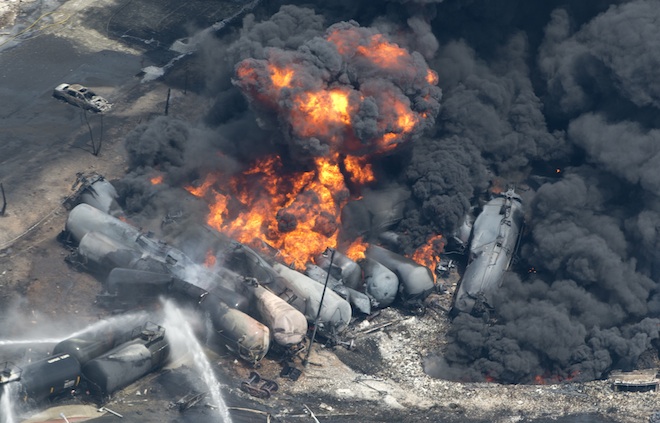LAC-MEGANTIC, Quebec (AP) — As firefighters doused still burning oil tanker cars, more bodies were recovered Sunday in this devastated town in eastern Quebec, raising the death toll to five after a runaway train derailed, igniting explosions and fires that destroyed the downtown district. With dozens of people reported missing, authorities feared they could find more bodies once they reached the hardest-hit areas.
Quebec provincial police Lt. Michel Brunet said Sunday that about 40 people have been reported missing, but cautioned that the number could fluctuate up or down.
“We met many people who had reported family members missing. Right now I can tell you about 40,” Brunet said.
Brunet confirmed two more deaths early Sunday afternoon after confirming two people were found dead overnight. One death was confirmed Saturday.
Fires were preventing rescuers from reaching part of the 73-car train, and billowing black smoke could still be seen long after the derailment.
The eruptions early Saturday morning sent residents of Lac-Megantic scrambling through the streets under the intense heat of towering fireballs and a red glow that illuminated the night sky.
Local Fire Chief Denis Lauzon likened the charred scene to “a war zone.”
“This is really terrible. Our community is grieving and it is taking its toll on us,” Mayor Colette Roy-Laroche said.
The search for victims in the charred debris was hampered because several tanker cars were still burning Sunday morning, sparking fears of more potentially fatal blasts.
Two of the five cars that exploded are still on fire 36 hours later, Lauzon said. He said firefighters are staying 500 feet (150 meters) from the burning tankers, which are being doused with water and foam to keep them from overheating and exploding.
“It’s a mess,” he said.
The multiple blasts came over a span of several hours in the town of 6,000, which is about 155 miles (250 kilometers) east of Montreal and about 10 miles (16 kilometers) west of the Maine border. About 30 buildings were destroyed after tanker cars laden with oil caught fire in the picturesque lakeside town in Quebec’s Eastern Townships.
The derailment caused several tanker rail cars to explode in the downtown district, a popular area packed with bars that often bustles on summer weekend nights. Police said the first explosion tore through the town shortly after 1 a.m. local time. The fire then spread to several homes.
Brunet said he couldn’t say where the bodies were found exactly because the families have not been notified.
The cause of the accident was believed to be a runaway train, the railway’s operator said. The president and CEO of Rail World Inc., the parent company of Montreal, Maine & Atlantic Railway, said the train had been parked uphill of Lac-Megantic. The tanker cars then sped downhill into the town before derailing.
“If brakes aren’t properly applied on a train, it’s going to run away,” said Edward Burkhardt. “But we think the brakes were properly applied on this train.”
Burkhardt, who was mystified by the disaster, said the train was parked because the engineer had finished his run.
“We’ve had a very good safety record for these 10 years,” he said of the decade-old railroad. “Well, I think we’ve blown it here.”
Prime Minister Stephen Harper announced he is heading to the town Sunday.
Because of limited pipeline capacity in North Dakota’s Bakken region and in Canada, oil producers are using railroads to transport much of the oil to refineries on the East, Gulf and West coasts, as well as inland. Harper has called railroad transit “far more environmentally challenging” while trying to persuade the Obama administration to approve the controversial Keystone XL pipeline from Canada to the Gulf Coast.
Myrian Marotte, a spokeswoman for the Canadian Red Cross in Lac-Megantic, said there are about 2,000 evacuees and said 163 stayed at their operations center overnight.
“There are those are still looking for loved ones,” Marotte said.
Marotte said many of the evacuees are staying with family and friends. “Some people have lost everything,” she said.
Lines of tall trees in the area looked like giant standing matchsticks, blackened from bottom to tip. Witnesses said the eruptions shook residents out of their slumber and sent them darting through the streets.
Patrons gathered at a nearby bar were sent running for their lives after the thunderous crash and wall of fire blazed through the early morning sky.
Bernard Theberge, who was outside on the bar’s patio at the time of the crash, feared for the safety of those inside the popular Musi-Cafe when the first explosion went off.
“People started running and the fire ignited almost instantaneously,” he said.
“It was like a movie,” said Theberge, who considered himself fortunate to escape with only second-degree burns on his right arm. “Explosions as if it were scripted — but this was live.”
Firefighters and rescue workers from several neighboring municipalities, including Sherbrooke and Saint-Georges-de-Beauce, were called in to help deal with the disaster. Firefighters from northern Maine were also deployed to the Quebec town, according to a spokesman at the sheriff’s office in Franklin County.
The train belongs to Montreal Maine & Atlantic. According to the railroad’s website, the company owns more than 500 miles (800 kilometers) of track serving Maine, Vermont, Quebec and New Brunswick.
Last week a train carrying petroleum products derailed in Calgary, Alberta, when a flood-damaged bridge sagged toward the still-swollen Bow River. The derailed rail cars were removed without spilling their cargo.
The Quebec accident was likely to have an impact across the border. In Maine, environmentalists and state officials had previously raised concerns about the threat of an accident and a spill from railroad tank cars carrying crude oil across the state.
The Montreal, Maine and Atlantic Railway carried nearly 3 million barrels of oil across Maine last year. Each tank car holds some 30,000 gallons (113,600 liters) of oil.
The Maine Department of Environmental Protection has begun developing protection plans for the areas where the trains travel, spokeswoman Samantha Warren said recently.
___
Associated Press writer Rob Gillies and Charmaine Noronha contributed from Toronto.









